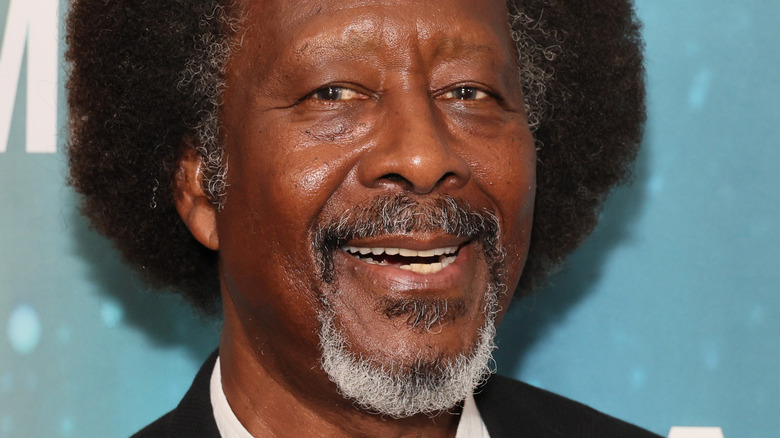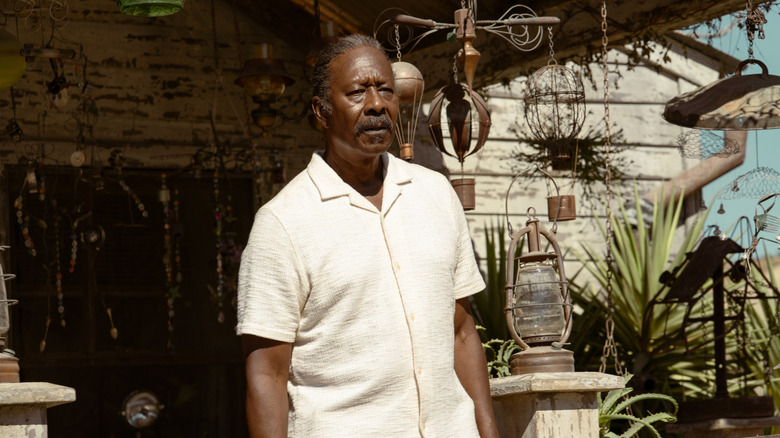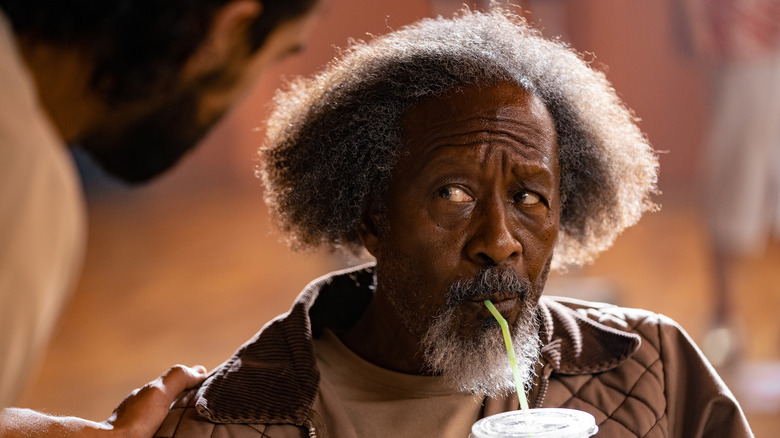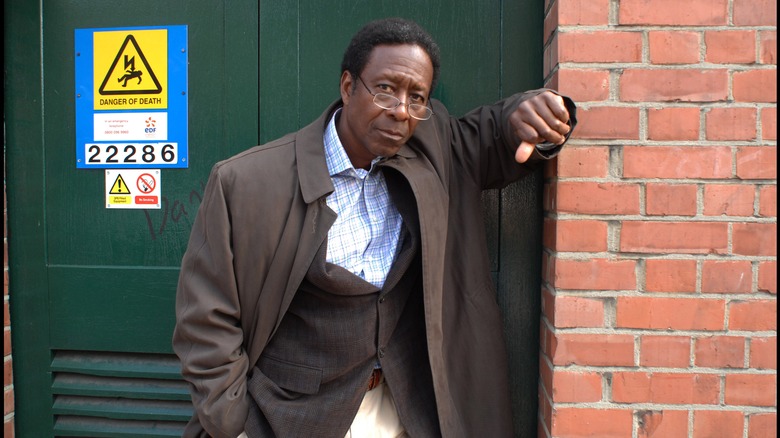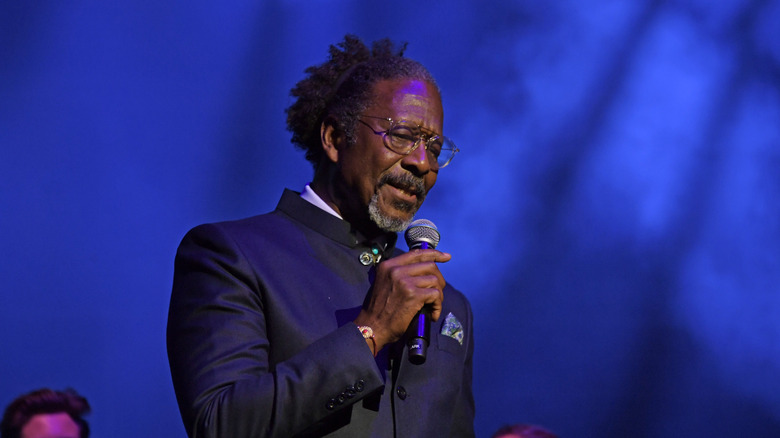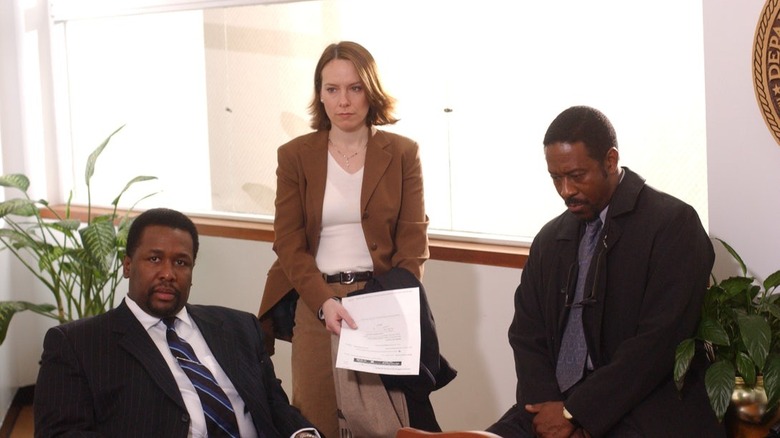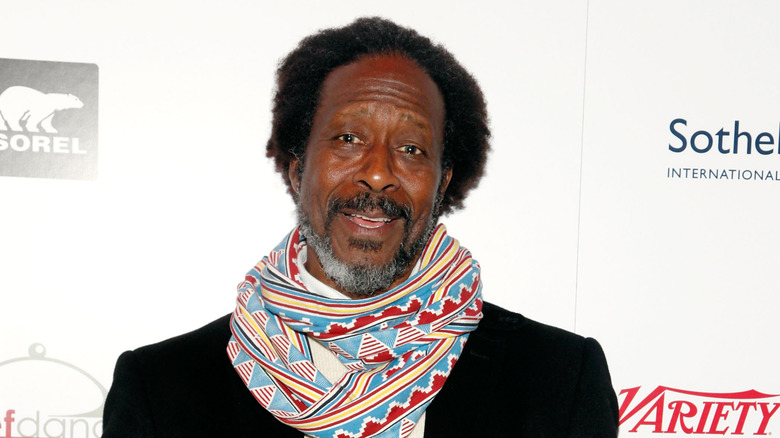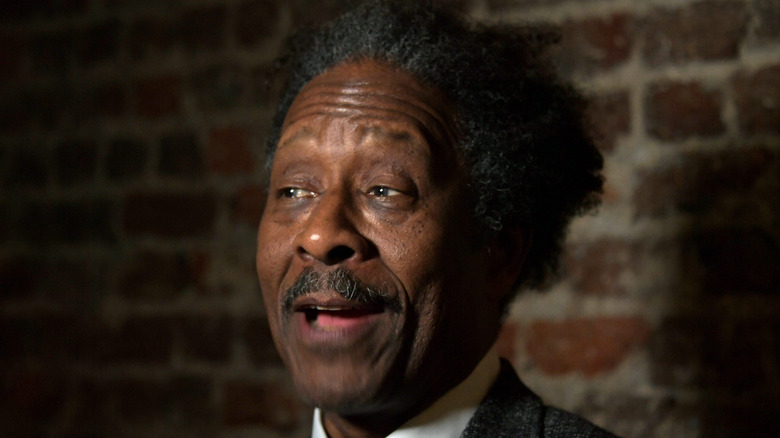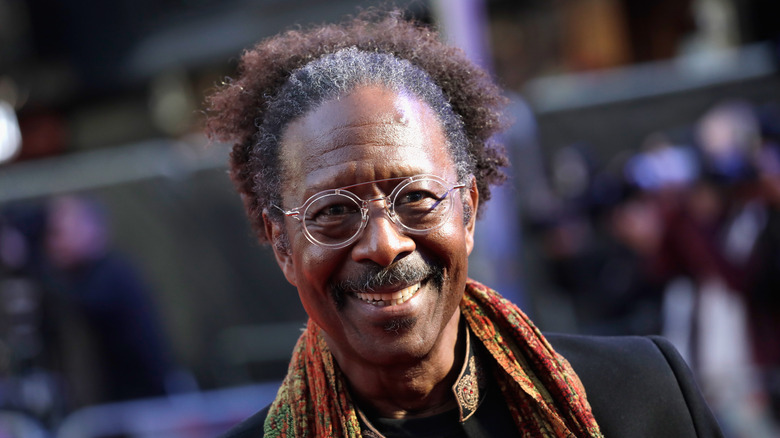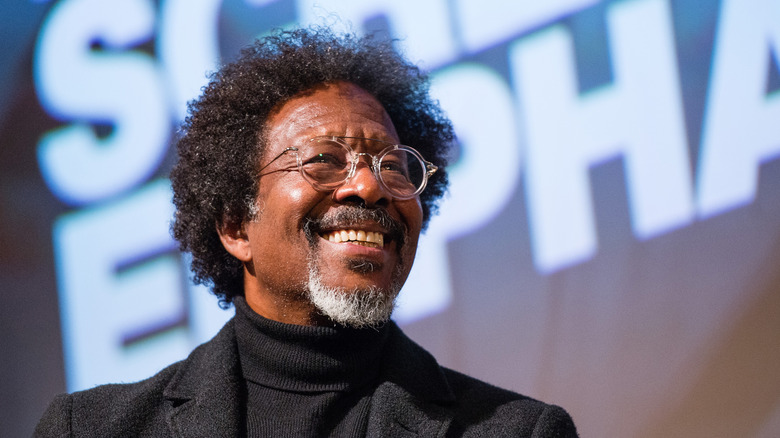Actor Clarke Peters Talks The Man Who Fell To Earth, The Wire And More - Exclusive Interview
If the name of actor Clarke Peters rings a bell, it could be because he's been a part of some of the most prestigious and influential television series produced during the past two decades. As a quick glance at his screen credits on IMDb makes clear, his roles have been doozies. Among them: shrewd, seen-it-all Baltimore PD detective Lester Freamon in "The Wire;" political power broker Dave Pell in "Damages;" South African civil rights leader Nelson Mandela in the 2013 TV movie "Mandela: The Prison Years;" cancer-stricken Mardi Gras Indian Chief Albert Lambreaux in "Treme;" the Master in HBO's "His Dark Materials;" and Abbas in "Foundation," the Apple TV+ adaptation of Isaac Asimov's classic sci-fi novel.
For his latest role, Peters is portraying Josiah Falls in Showtime drama "The Man Who Fell to Earth," a continuation (of sorts) of the mind-bending 1976 science-fiction film starring David Bowie.
In an exclusive interview with The List, Peters — speaking via Zoom from his adopted home of Portugal — discusses his new role, ponders the enduring legacy of "The Wire," and shares his insights into acting, the craft he's been honing professionally for more than five decades.
Clarke Peters on his new role in The Man Who Fell to Earth
What can you tell me about Josiah Falls in "The Man Who Fell to Earth?"
Josiah Falls is an immigrant from The Bahamas who was of high academic achievements and was brought in to America to help with some top secrets ... I can't tell you what [those top secret projects are]. While there, he married and he fell in love and produced this beautiful child named Justin [played in the series by Naomie Harris]. Over the course of the years, he contracted an illness that has left him incapacitated. Although his body is crippled, his mind is still very active and it is very much alive in his daughter. If I tell you any more than that, I'm afraid that I'm going to have to withhold your subscription from Showtime.
How did you come to get involved in the series?
I received a call from the producers and the writers and over maybe two or three calls, we talked philosophy of what's happening here actually on Earth. We shared our concerns with the way the earth today is being managed. I didn't realize that the script was what it was. I didn't realize that our conversations were actually feeding into the development of that script and the point of view and the things that need to be said.
When you become attached a project like this one, did you go back to the original novel and look at the David Bowie movie, or do you set that aside?
I set that aside. This was a continuation of that, and as we were talking about the issues that deal with today, I want to deal with what's happening today and bring as much of what I'm feeling about the way we manage the earth today to the piece.
Projects that educate as well as entertain
From what I've seen so far, this is certainly not a cookie-cutter show. There's some really, as you mentioned, philosophical concepts at play here, which does demand a certain level of attention from the viewer. When I think about some of the work that you've done before, "The Wire," "Treme," things like that, are you attracted to projects that, for lack of a better term, would be considered challenging?
Yes. The medium[s] of television and film [are] not just there to entertain, but it's also to educate. People don't read books these days; they feel like they get educated by the television or buy what they're seeing or buy the iPhone or the iPad. I really don't want to use my craft in a way that's going to dumb people down. Neither am I just trying to chase the next dollar, but I feel that if I have this type of profile, let's apply it to projects that are serving as well as entertaining rather than pure escapism.
"The Wire" was informative. We didn't know what we were doing until it was done. Because of "The Wire," that's changed my philosophy of acting, and then came along "Treme" and "Show Me a Hero." They were all pieces that had some social input and were necessary and it demands you to watch it, to listen, to maybe promote a conversation or a debate. I do like those, and yet, having said that, I'll do the crap too, but I prefer to use our craft for those reasons.
It occurred to me that Bill Nighy is playing Thomas Newton, which was David Bowie's role in the original film. I know you spent so much time working in theater in London. Did you two ever work together or encounter each other prior to this?
No. We always encountered each other when we get nominated for things. We're probably the most nominated actors in England without ever receiving an award. I've not worked with him before and I'm glad to be working with him now and we don't really get a chance to play. We haven't had a chance to play together and I look forward to doing something like that with Bill because he's ... I can't say ebullient because he's not ebullient at all, but he's a lovely man, and I respect his work and I've admired him for many years.
Clarke Peters on his love of theater
You've spoken extensively about how much you love theater and how it really is your preferred medium of acting. Now, how do you split your time between theater and film and movies? Is it based on the role, or do you try to do a certain amount of theater every year?
I was doing that for a while when I was doing "Treme," and actually, the last time was "Treme." I haven't done any theater work since just before the lockdown. Prior to that, I would have six months on and six months off. When I had that time off, I would try to find something to do in theater.
The reason why you'd go to theater is to hone your craft. You get stuck in the mindset of, "I can take this again. I can take it again. I can do this in increments." Something is lost in the storytelling for the actor, the journey for the actor. Particularly for me, I'm getting at that age where it's hard to go back, to figure out what I did when I was outside the door last month [in a scene filmed out of sequence]. Now, I'm walking through the door this month, but doing theater [and] doing radio plays helps one to keep the continuity of what they're doing intact.
Philosophy on acting on stage vs. onscreen
The technical aspects, the nuances of acting for film, acting for theater, doing voiceover work, they've all got some differences. How do you approach that?
What I'm finding with acting in film now is that, number one, I understand it a lot better and I don't have to work as hard. I understand now that the camera reads everything that's in your face. In theater, you can give a performance that's larger than life, but actually, you're worried about your telephone bills or your wife or your child or your house. In film, you can't do that, right? It's helped me to focus on my character, my character's intention, [and] my character's motivation.
For radio, what I like about that is that you do get a couple of times ... and it's just your voice. You have to really tune into what you're feeling or what the character is feeling in order to voice it accurately. These are all nuances of the overall craft of acting on stage. Stage is larger than life. Film is very introverted. Radio is even more introverted. You can't really scream on radio. Even in film, you can't really be too large unless you have a cameraman who says, "Go for it, and we will be a fly on the wall." Other than that, most people are playing for the camera rather than being in the scene themselves and letting the camera do the work.
In terms of that, what about the aspects of being able to do multiple takes and try different things?
It's not my performance that's being shown. At the end of the day, it's in the hands of the editor. The editor takes that and puts it together. Now, people who come up who have acted through the school of just cinema, they know how to force an editor to take the takes that they want by doing certain things at the end of it. [They might be] looking in a different direction or dropping their voice or something, any little nuance to get the performance they have. I don't have that kind of [cunning], but I'm learning.
The enduring legacy of The Wire
You mentioned "The Wire" earlier and I was reading that the BBC named it the best TV show of the 21st century. That must feel amazing to be a part of something so esteemed.
Yeah, it is, and humbling. It feels real good. We didn't know what we were doing when we were doing it. It took ... I didn't see the whole thing until 2012, because I was working. I'd come on back and you show it in America, and then I would come up the next year and it'd be a new season. I knew something was up when I was walking down Eighth Avenue and people start staring at you or following you. My old time New York sense goes up and I'm thinking, "All right, hold on a second." It's that sense of celebrity that comes from [recognition] that's a new experience and is still growing. There's a new generation that's discovering that. There's a new generation that's debating that.
My son, who couldn't see that as a child, now has friends who talk about that and reference it. It's an ongoing experience and it does feel good, There's no doubt about it. I'm not going to deny it. I'm not going to ever say that, "All right, yeah, that was back then." No, that was seminal stuff, and it was something that the Western world needed to see, because what [series creators] David [Simon] and Ed [Burns] had done was basically deconstruct society across the Western world.
The drug problem was not just for Baltimore. That drug problem was in Spain, was in France, was in Italy, is in England, is in Germany, is in Scandinavia. The corruption in the police is all over. The education nowadays is being undermined across Europe as well. It's more than a television show, and that's why the BBC decided to define it as such.
Clarke Peters believes The Wire tells a story that's relevant worldwide
Interestingly enough, even though it is such a quintessentially American story, the storytelling had a European flare to it, in that there wasn't that kind of exposition that we're used to in American television. Even as someone who watches film and television critically, it took me a couple of episodes before I really figured out who everyone was and what their relations were to everyone else. Once you get up to speed, it's addictive as anything.
A criticism of American television viewing is that it doesn't engage people's intellect, and "The Wire" engaged people's intellect across the board, across the classes, across the races. It promoted a conversation, and because it did that, it felt like we were opening up people's minds and because it wasn't formulaic and had that European approach, or as David liked to say, a Dickensian approach to it ... I don't know what else to say about that. It was spot-on for America, and I'm glad that it came out there, too. Contrary to what you're saying, that it was quintessentially American, my point is that it isn't quintessentially American. It's that it really is worldwide. All of that is worldwide, as we're even seeing today.
His passion for holistic medicine
I also wanted to ask you about your involvement with the British Holistic Medical Institution. How did that come about and how important is that to your lifestyle and, by extension, to your work?
That's very important. I got introduced to it through a man who helped me recover from a back injury, [and] allopathic medicine was going to slice and put me back together. This man said, "Let's try homeopathic medicine." Coming through homeopathic medicine led me into tai chi, led me into a more holistic way of looking at the body and I feel great behind it. I can only use my experience with the medicine to promote it. I see that people give up the responsibility of their health to someone who is working in theory, coming out of the university. They have not done the work, and yet a 28-year-old [or] a 30-year-old doctor is going to be looking after an 80-year-old man or woman and telling them what to do with their bodies.
It doesn't work. You can't ... The thing about holistic medicine is that it is holistic. It's not just what you ingest. It's your lifestyle and we have to live in this world of technology, but be aware of that. Be aware of the pitfalls of having this radiation around you, for example, and how to take care of that. There's no use in tearing down the massive 5G towers and all of that stuff. If you don't know what to do when it affects you, go figure that out.
That's why holistic medicine for me works, because it gives you those answers if you look through it naturally. Naturally. You can go into your garden and find more remedies there that a pharmacy can serve you, has been synthesized because it is the whole plant that is working in harmony with your whole body, rather than the element that has been synthesized. It is very important for me and also something I think other people should open up their minds to. At least take the blinkers off, consider it. [That's] all that I ask, for your own health. Your health doesn't affect me, but it affects you, and it's your body, it's yours. There are alternatives, so follow them.
Why holistic medicine works for him
That's really good advice. Now, in terms that, how would you introduce holistic medicine to somebody who is maybe not familiar with it? Is there a way to describe it in a point-form way?
There's a couple of ways I can do this. We are told in church that God picked up some earth and breathed into it, and there was a man, right? In that, there's also that there's part of you that is connected with that earth. Part of you is part of that earth. Whether you want to look at it philosophically, or whether you want to look at it from a quantum physics point of view, or a biological point of view, the matter that makes you is also in your environment. The majority of your body is made up of salt water. The majority of the earth is salt water. When we begin to look at these connections and make these correlations and look at the illnesses that are coming around and look at the earth and where it is suffering, we begin to see that we are also part of this whole system.
This is probably the easiest way to define holistic. Think of it as being whole, of you being part of this whole system that you're living in. The air that you breathe, the water that you drink, the food that you ingest. And if you can reduce that down to just the essences, you'll be on the right track to understanding what holistic medicine is about. Bringing your body into harmony with everything else that's around you, but it's your responsibility.
It's not just what you ingest. It's also taking time to sit back and meditate, to sit back and to think about where you are in this world, where you are in the relationships that you're in. All of that has impact on your nervous system, your emotions, and physically. There isn't one sentence that can describe the holistic experience. Although the word "holistic" isn't as simple as just being whole, if you were to consider that, you would be on the right track, if you were to consider that is "holistic" rather than "nihilistic."
Clarke Peters is playing a key role in the upcoming biopic of Whitney Houston
As we're speaking, you're in Portugal, where you live. How did you wind up there?
I have a friend who was a travel writer for The Guardian, a food writer. He had discovered this particular town and invited us down. My first weekend here, I was able to experience Faro and then go to a jazz club and listen to Miles Davis. I thought if I could get the culture and get Miles at the same time, this has got to be the place. Not only that, it's a place that is ... I wouldn't say... It's inexpensive. The quality of life is very good. I have fresh food, fresh vegetables, [and] I can live a holistic life.
What roles will we be seeing you in next?
We've just got finished doing Whitney Houston's life. I will be playing her father in the upcoming film, "I Want to Dance With Somebody." Looking at it from an objective point of view, I can look at Whitney's life in a different light.
New episodes of "The Man Who Fell to Earth" air Sundays at 10 p.m. ET on Showtime. Episodes are also available to stream for subscribers.
